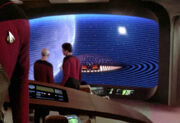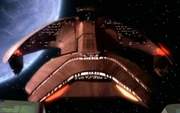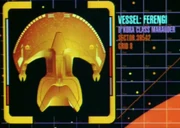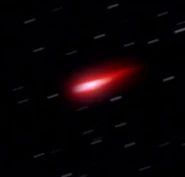m (finetuning) |
(→Studio model: secioin) |
||
| Line 93: | Line 93: | ||
The scene where the Ferengi "surrendered" was in the script described as (Scene 21): "The snake head-like prow's pushing out from the ship body," and (Scene 22): "The Ferengi ship now extends gun-like arms from either side of the prow." [http://www.st-minutiae.com/academy/literature329/107.txt] It constituted a scene to indicate that, as Probert put it, "''The Marauder's stretching neck...was a locked-in script requirement, to reveal their ship's sensitive areas as their way of surrendering. The writer/producers wanted it to look like a horseshoe crab...[T]he "claws" were a variation of the Klingon disrupter designs from TOS." (remember the metal plates on either side of the "barrel"?''[http://flare.solareclipse.net/cgi2/ultimatebb.cgi/topic/6/554/4.html#000045] [http://flare.solareclipse.net/cgi2/ultimatebb.cgi/topic/6/2594/3.html#000037] |
The scene where the Ferengi "surrendered" was in the script described as (Scene 21): "The snake head-like prow's pushing out from the ship body," and (Scene 22): "The Ferengi ship now extends gun-like arms from either side of the prow." [http://www.st-minutiae.com/academy/literature329/107.txt] It constituted a scene to indicate that, as Probert put it, "''The Marauder's stretching neck...was a locked-in script requirement, to reveal their ship's sensitive areas as their way of surrendering. The writer/producers wanted it to look like a horseshoe crab...[T]he "claws" were a variation of the Klingon disrupter designs from TOS." (remember the metal plates on either side of the "barrel"?''[http://flare.solareclipse.net/cgi2/ultimatebb.cgi/topic/6/554/4.html#000045] [http://flare.solareclipse.net/cgi2/ultimatebb.cgi/topic/6/2594/3.html#000037] |
||
| − | The intent was faithfully copied by [[Gregory Jein, Inc.]], as one of the earliest alien starship designs. Though constructed to all the specifications asked for, in the end the model proved to be faulty as [[Image G]]´s CEO [[Tom Barron]] testified to |
+ | The intent was faithfully copied by [[Gregory Jein, Inc.]], as one of the earliest alien starship designs for [[TNG]]. Though constructed to all the specifications asked for, in the end the model proved to be faulty as [[Image G]]´s CEO [[Tom Barron]] testified to: |
| + | <blockquote>"The only person we could find who was willing to try to build it on our timeline was Greg Jein, who had been working on ''Star Trek'' forever. But on top of everything there was supposed to be this articulation–the arms were going to extend out into a threatening posture. Well, of course, we were trying to knock this stuff out in an incredibly short period of time. We're literally talking about a situation where hours made the difference. The Art Department came up with drawings, and Greg did exactly what was required; it was a motion control, articulated ship that had these arms that extended out, but, because of the timeline, that articulation was never really seen on the show.The model worked but it was too timeconsuming to shoot it. I remember it had internal lighting, but when we went to articulate the arms it crushed the neon, so the lights all got knocked out right away! Because of the problem with the articulated ship, Greg knocked out an additional version that was literally just a casting that he did in a day. We slapped it on a stick, and that's what we used in the show more than anything else. We did end up with a shot where the arms moved a little bit. Then, when they finally cut the show together and put it on the air, there was almost none of that left either. Then, when they decided the show ran a little bit long, they cut another second; then, if there were any extra commercials, that cuts out the rest of th shot. From then on, we used this shell, and we never used the articulated one again."(''[[Star Trek: The Magazine Volume 3, Issue 1]]'', pp.61-62)</blockquote> |
||
The ''D'Kora''-class model (measuring 36"x32") was listed in the [[40 Years of Star Trek: The Collection]] auction with an estimated sale price of $4,000 to $6,000; it sold for $15,000 ($18,000 with premium). {{stala|1778-0710}} |
The ''D'Kora''-class model (measuring 36"x32") was listed in the [[40 Years of Star Trek: The Collection]] auction with an estimated sale price of $4,000 to $6,000; it sold for $15,000 ($18,000 with premium). {{stala|1778-0710}} |
||
Revision as of 03:50, 1 October 2011
The D'Kora-class Marauder was a type of advanced starship utilized by the Ferengi Alliance during the 24th century.
This class of vessel was, at times, referred to by several classifications, including both a warship and transport ship by the Federation, and as an attack vessel by the Ferengi themselves. (TNG: "Peak Performance", "Force of Nature")
Technical data
During the early 2360s, Starfleet had no specific data on the design of the vessel, and at the time of First Contact, possessed the general knowledge that Ferengi technology was estimated to be generally equal, but not identical, to Federation technology. Upon first view of this class vessel in 2364, Jean-Luc Picard described it as a "very impressive design." (TNG: "The Last Outpost")
The D'Kora-class was described by Geordi La Forge as being "almost as fast" as a Template:ShipClass Federation starship. (TNG: "Ménage à Troi")
Overall, the class was shorter in length than a Galaxy-class. (TNG: "The Last Outpost")
Tactical systems
The D'Kora-class Marauder was equipped with a variety of directed energy weapons, possessing placements for weapon ports at the "claws", positioned on the port and starboard sides, and a torpedo launcher located at the peak of the ship's primary hull. (TNG: "The Last Outpost", "Peak Performance", "Force of Nature") This class of vessel was also equipped with a forward missile launcher. (TNG: "The Price")

Firing an electromagnetic pulse
In addition, the D'Kora-class was equipped with a form of energy weapon emitted from the aft of the ship, detectable by a marked power surge prior to discharge. The resulting electromagnetic pulse was capable of weakening the deflector shield power of a Galaxy-class starship, as well as the capability of depleting the fusion generator and batteries by as much as thirty percent in a single discharge. (TNG: "The Last Outpost")

With extended "neck", revealing weapon ports
In cases where a D'Kora's DaiMon was forced to surrender, the ship would extend its "neck", and open the ship's weapon ports to expose the ship's sensitive areas. This posture was also sometimes viewed as a preparation to attack. (TNG: "The Last Outpost")
Auxiliary vessels

Integrated shuttle
It has been observed that at least one D'Kora -class vessel was equipped with an embedded auxiliary vessel, capabilities of which are unknown to date. (TNG: "The Last Outpost")
Ships commissioned
- Named
- Unnamed
Appendices
Appearances
- TNG:
- VOY:
- "Drone" (database image)
- "Inside Man"
Background

Display graphic depicting both designations
The term "D'Kora-class" was first associated with this Ferengi starship class in "Force of Nature", and again in display graphics appearing in the two above referenced Voyager episodes. With exception to Nog's reference to Template:ShipClass attack cruisers in "Little Green Men", the only reference to this design being referred to as a "Marauder" (outside of the Star Trek Encyclopedia) was in a display graphic appearing in "Inside Man" (shown right).
Studio model
According to the Star Trek: The Next Generation Companion (3rd ed., p.38), the design was inspired by a horseshoe crab on Herbert J. Wright's desk. As such it was carried over into the script of "The Last Outpost", where it was referenced as "a strange horseshoe crab-like design, a bit smaller than the Enterprise." [2]
Design
May 1987 preliminary design of the Marauder.

Definitive design by Probert.
As it so happened, the horseshoe crab design coincided with Gene Roddenberry's dictum of warp engines operating in pairs as designer Andrew Probert reiterated:
"Now, Gene dictated that there are no three-engine starships and no single-engine starships. When I was first designing the new Enterprise he said, "The Federation ship's engines always are co-dependent". It is the same as to say they always worked in twos. So that's why when Sternbach and I came up with the Stargazer, it had two sets of twos. And then I started thinking that, back in World War II, all the nations that had fighter aircraft and airplanes did the same thing: they took off, they flew, they landed, they maneuvered. They usually had one engine, two wings, two tailwings --so they all had the same components, but they all looked different. There was a national design bias to each aircraft, but technically they all did the same thing. So my thinking was in Star Trek--since the Enterprise used to have two engines--I came up with the idea that the engines had to reach out to each other in order to work co-dependently. In other words, there would be no obstructions between the engines to disrupt the energy fields or connecting forces between them. And, well, all the alien ships could look different but still operate in the same principle. So that's why the Ferengi Marauder is curved, is concave, because that allows the two engines to reach each other."Template:Brokenlink
Further clarifying on his design, he commented:
"The Ferengi people were basically space pirates, so I tried to give their ship a threatening look by adding pointed areas at the front, like the back of a pincher bug, and had had it look dirtier and was a little battle-scarred. Then to support the pirate persona, and provide for future episodes, I designed an extendable boarding ramp into the underside of the ship's nose, with a clawed front that would be used on raids. Another feature I designed into the Marauder was a large attack ship nestled into an underside docking cavity. This forward-swept wing "drop ship" could land for planetary raids or maneuverer in space. The Marauder's overall length was to have been about 1,200 feet." (Starlog photo guidebook Special Effect Vol.5, 1996, pp.111-112)
Physical studio models
The scene where the Ferengi "surrendered" was in the script described as (Scene 21): "The snake head-like prow's pushing out from the ship body," and (Scene 22): "The Ferengi ship now extends gun-like arms from either side of the prow." [3] It constituted a scene to indicate that, as Probert put it, "The Marauder's stretching neck...was a locked-in script requirement, to reveal their ship's sensitive areas as their way of surrendering. The writer/producers wanted it to look like a horseshoe crab...[T]he "claws" were a variation of the Klingon disrupter designs from TOS." (remember the metal plates on either side of the "barrel"?[4] [5]
The intent was faithfully copied by Gregory Jein, Inc., as one of the earliest alien starship designs for TNG. Though constructed to all the specifications asked for, in the end the model proved to be faulty as Image G´s CEO Tom Barron testified to:
"The only person we could find who was willing to try to build it on our timeline was Greg Jein, who had been working on Star Trek forever. But on top of everything there was supposed to be this articulation–the arms were going to extend out into a threatening posture. Well, of course, we were trying to knock this stuff out in an incredibly short period of time. We're literally talking about a situation where hours made the difference. The Art Department came up with drawings, and Greg did exactly what was required; it was a motion control, articulated ship that had these arms that extended out, but, because of the timeline, that articulation was never really seen on the show.The model worked but it was too timeconsuming to shoot it. I remember it had internal lighting, but when we went to articulate the arms it crushed the neon, so the lights all got knocked out right away! Because of the problem with the articulated ship, Greg knocked out an additional version that was literally just a casting that he did in a day. We slapped it on a stick, and that's what we used in the show more than anything else. We did end up with a shot where the arms moved a little bit. Then, when they finally cut the show together and put it on the air, there was almost none of that left either. Then, when they decided the show ran a little bit long, they cut another second; then, if there were any extra commercials, that cuts out the rest of th shot. From then on, we used this shell, and we never used the articulated one again."(Star Trek: The Magazine Volume 3, Issue 1, pp.61-62)
The D'Kora-class model (measuring 36"x32") was listed in the 40 Years of Star Trek: The Collection auction with an estimated sale price of $4,000 to $6,000; it sold for $15,000 ($18,000 with premium). [6]
Apocrypha
The D'Kora-class has made appearances in several video games including Star Trek: The Next Generation - Echoes from the Past, Star Trek: The Next Generation - Birth of the Federation, Star Trek: Armada, Star Trek: Armada II, Star Trek: Bridge Commander, and Star Trek Online.
External link
- Template:NCwiki


